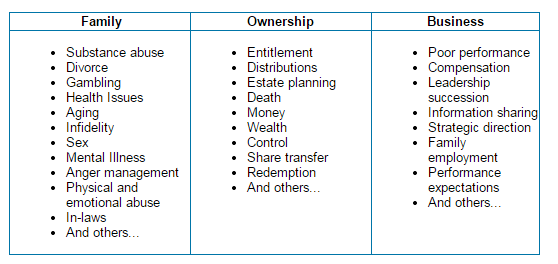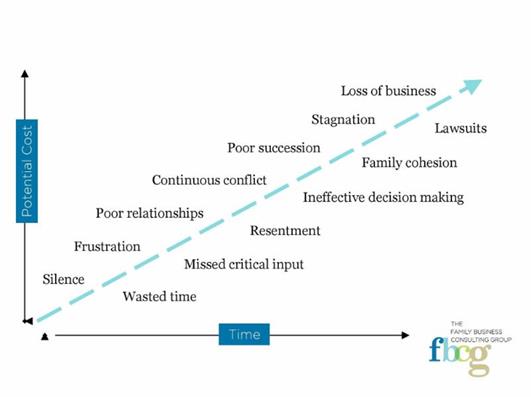Enterprising families often have rituals that bring joy, connectedness and stability to their members. Unfortunately, these families can also breed practices that are destructive to the cohesion of the clan. One such practice is the avoidance of difficult conversations, which over time creates taboo topics in a family, their businesses, or both. Often parents, children or others in the family or business do not know how to approach subjects that cause friction, tension or hurt feelings, so that over time, these subjects simply become “undiscussable.”
Undiscussable topics are the subjects that a family is unable or unwilling to talk about in an open, honest and candid manner. When the family tries to address the issue, tempers flare, behavior becomes defensive and the conversation devolves into a silent quagmire or four-alarm blaze. Because enterprising families have more overlapping systems (family, business and ownership) than most, they face more opportunities to create taboo topics.
Topics that are undiscussable vary from family business to family business but include subjects in each of the three systems that comprise a family enterprise:

Undiscussables are typically highly charged emotional issues where pain, guilt, embarrassment or shame often lurk. These heightened emotions prevent family members from feeling comfortable enough to open the discussions without hurting feelings or causing mayhem. Sometimes these topics are undiscussable because family members are afraid of pushing someone further away emotionally and psychologically (e.g., someone who is a heavy user of alcohol or drugs). Others may want to avoid talking because it might mean “I don’t get what I want” or a change is on the horizon.
How Undiscussables Manifest in a Family
The effect of allowing these undiscussables to lie in wait under the surface of our relationships is much like a bubble trapped under a sheet of ice. The bubble will move around under the surface until it has a chance to escape through a more fragile location. Similarly, in a family business, too often the issues break loose in an unsuspecting manner where pent-up emotions spill forth in a destructive way. Unfortunately, this reinforces the family’s fear of these topics, leading to more avoidance and creating more tension.
People respond to tough topics in many ways. Some completely clam up and refuse to engage in the conversation at all. Others get defensive or self-righteous and start attacking people personally. Some will try to push or goad their relatives about an issue over and over again. When these others don’t oblige, they rant, rave and scream. Parents or siblings may take on the role of “peace-maker” and try to fix it all. They may want to rescue the family or certain individuals from pain and embarrassment. These folks attempt to shoulder the responsibility for under-functioning family members rather than allowing each person to be accountable for their own actions or inaction.
Undiscussables in Action
One couple who was financially well-off had never talked with their children about wealth or their relationship to money. Money was simply not discussed. The parents had worked with skilled legal advisors to set up various trusts to safeguard the wealth yet could not bring up the topic of inheritance with their adult sons. So the boys had no idea what the parents were worth or how much they would be receiving when the distributions began. The parents feared that if the boys knew about the wealth it would make them lazy and entitled. Their fear about the discussion of wealth lead the parents to make the matter much bigger than it needed to be.
The parents’ anxiety created more tension which, like the air bubble trapped under the ice, came out in excessive critiques of how the boys lived their own lives (e.g., the money that they were spending with their wives and children). These excessive critiques began to cause ill will with the in-laws. When the subject was finally broached with the aid of the skilled facilitator, the family was able to constructively and creatively talk about the wealth in a meaningful matter. The boys were responsible, had good work ethics and strong values that they had learned from their parents. Soon, the parents discovered that the control they were seeking over their children’s spending habits was just that, controlling behavior, and the children began to see the parents’ fear of entitlement as legitimate.
Anxiety – no matter what the cause – moves around a system wreaking emotional and behavioral havoc unless the family is skilled at managing it. When family members are not able to tackle certain subjects with maturity and thoughtfulness, blame, scapegoating, over/under functioning and potential cut-off take place. One example of this was a business-owning family in the Midwest. The couple had three adult children: one who lived nearby and two who lived quite far away. The mother doted on the child who lived nearby. This child had an active night life which affected her ability to get to work on time and function optimally when she was there. The mother would make excuses for the daughter and cover for her which created the dynamic of an over-functioning mother with under-functioning daughter. The mother was fearful of imposing any consequences on her daughter because she didn’t want her to move away.
The mother had her own responsibilities at home and at work but was also taking on the responsibilities of the daughter. The mother was exhausted from trying to compensate for her daughter, yet the daughter was also unable to get out from under her mother’s thumb. The more the mother worked, the more the child became reckless: it was a destructive cycle. The other two children began to resent the third sibling and the relationship with their mother deteriorated. The father was aware of the situation but didn’t know what to do, so he did not talk about it. It had become such an elephant in the room that the family no longer got together and the siblings no longer had a close relationship. The situation slowly changed when the family started working with an advisor to develop healthy boundaries between the family and the business, which also allowed the father to re-insert his voice and influence.
The Cost of Undiscussables
The cost of undiscussables can be enormous. Over time, the cumulative negative influence of taboo topics on family communication and trust can be significant, especially where there is continuous, intense conflict or an inability to solve issues. The costs may include divorce, estrangement, lawsuits and the like. The following diagram illustrates the potential increase in costs over time:

The question to ask is how do families make an undiscussable topic more discussable? How can they put the tough, messy subjects on the table in such a way that everyone can talk in a meaningful, non-judgmental and calm manner? Families need to name the issue, start small and build capacity to take on these taboo topics. Building capacity takes time, effort and courage; it is hard – but given the consequences from continued avoidance, it is essential.
Moving from Undiscussable to Discussable
At the individual level, the first step is to give the undiscussable a name. Naming the “elephant” helps to move it from a tacit experience to a more explicit level which allows the family to talk about it more clearly.
The next step is to surface personal assumptions and beliefs about the issue. Some questions to help reflect on an issue include the following:
- Which undiscussable(s) do I react to and why?
- What are my assumptions and beliefs about this issue?
- How does my behavior create and foster undiscussables in my family?
- Do I get defensive? Do I get angry?
- What are the triggers that cause me to react?
- What is the cost to me and to my family if we continue to avoid conversations?
- What are the conditions that would help me to dialogue about this topic with my family?
At the family level, it is important to get permission to talk about an issue with everyone involved. This may mean having one-on-one conversations with each person. Often a family facilitator is able to provide a neutral resource to allow all voices to be heard. Once everyone has agreed to talk then it is a matter of convening a meeting with everyone. This step can be the most challenging one because although everyone has agreed theoretically to have the conversation, the actual “doing” of the conversation is far more difficult. In addition, busy schedules, geographic distance and a host of other things get in the way of convening a meeting.
Once everyone is in a room, it is a matter of agreeing on meaningful rules of conduct and allowing everyone to voice their own perspectives, wishes and biases. Patience, courage and good intentions are key ingredients for a meeting like this to be successful.
Business families are implementing a wide variety of practices to help move undiscussables to the conversation table. Some strategies are incredibly simple. For example, one family hosted a brainstorming session just to identify the undiscussable issues that were important for them to work through. These issues were then prioritized. This family now has a standing agenda item at every family meeting which is one undiscussable topic. Some families use the development of family participation policies or guidelines as a starting point for undiscussable topics. The point is, families do not have to continue to suffer the ill-effects of undiscussables if they can name the problem, agree to talk about it together, and dialogue about the issues in a meaningful way to find solutions. It takes commitment, courage and tenacity to build up the family’s capacity to tackle these issues, but it can be done. Topics that were once off-limits can become the rallying point for healthier family relationships.

